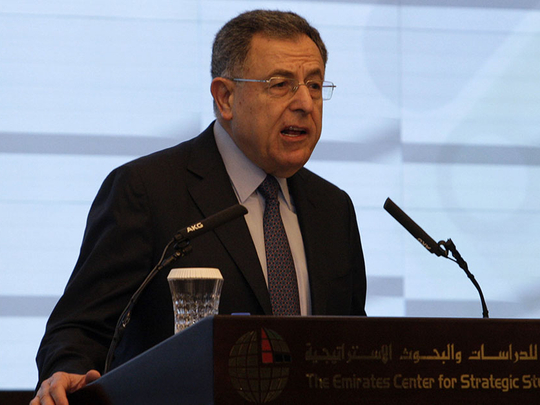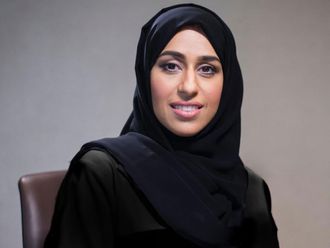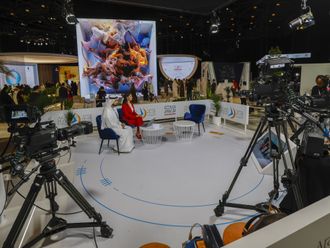
Abu Dhabi: Priority should be given to restore strategic balance in the Middle East and stop superpowers and regional countries from using the Arab countries to achieve their goals, a regional security conference heard in Abu Dhabi on Tuesday.
Political, economic and military alliances between the Arab countries will restore the balance of power and strengthen political and security order in the Middle East, officials and security experts told the 20th annual conference of the Emirates Centre for Strategic Studies and Research which was themed, "The Middle East: Shifting Roles, Interests and Alliances".
“Following the military coup in Yemen, former Arab League Chief Amr Mousa and I called for building a joint Arab force to keep the strategic security and integrity of Arab countries and to protect their air and maritime routes. The unified Arab military force is a true expression of what we hoped for,” said former Lebanese Prime Minister Fouad Siniora.
Siniora’s remarks came a day after an Arab leaders meeting at a summit in Sharm Al Shaikh, Egypt, announced the formation of a unified military force to counter growing security threats from Yemen to Libya.
Defeating extremism
“The Arabs and moderate Muslims are the only forces capable of defeating extremists and terrorists in the region and only a civil state can guarantee respect of its citizens,” Siniora said.
Siniora said the Arab world should draw lessons from the Emirati unity experience.
“Emirati history is a lesson that the UAE offers to the Arab world: that of forging strength of unity from weakness of disunity, and of encouraging diversity in a wider frame of unity; of the recognition of other cultures, while retaining and preserving national identity, independent decision-making, and visionary strategy,” he said.
Siniora added the Arab countries have to keep collective security and increase the common interests through activating joint political, security and economic cooperation.
“There must be firm Arab action to restore strategic balance in the region and counter the Iranian hegemony and control of the Arab countries,” Siniora said, stressing the key role Egypt can play in this regard.
Siniora also suggested boosting cooperation with Turkey to help address the situations in Syria and Iraq.
War on extremist ideology
Egypt’s former foreign minister Mohammad Al Orabi told the conference the war on terror should include all Islamist extremist groups, emphasising the need to fight the extremist ideology behind Daesh and other terrorist groups and not simply the groups themselves.
Al Orabi said Egypt was working hard to unite Syrian political factions and was adamant that its efforts are guided by the views of patriotic Syrians, without interference from Egypt or external parties.
“Egypt will offer political support if necessary,” he said.
Dr Jamal Sanad Al Suwaidi, Director-General of the ECSSR, said the UAE was proud that it was one of the first countries that had legislated an integrated law combating terrorism and its cross-border crimes.
“Due to the complicated interwined relationships of the states in the region, the rapidly changing political and security landscape of the Middle East affects each country as well as their interests and alliances,” he said.
Richard Barrett, Senior Vice-President, the Soufan Group, a strategic security consultancy based in New York, said the last 13 years have seen a non-stop campaign against terrorism, and yet we face more widespread disruption from armned non-state actors today than we did in the immediate aftermath of the attacks in the United States in 2001.












